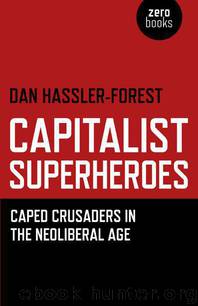Capitalist Superheroes: Caped Crusaders in the Neoliberal Age by Dan Hassler-Forest

Author:Dan Hassler-Forest
Language: eng
Format: mobi, epub
ISBN: 9781780991801
Publisher: John Hunt Publishing
Published: 2012-12-06T00:00:00+00:00
Superhero figures occupy a similarly dualistic position towards this fundamental boredom that defines our perception of life in the metropolis. On the one hand, characters such as Spider-Man and Superman seem to embody the opposite of the flâneur, always moving through the city with a clear sense of purpose, without any interest in the idle pursuit of commodities or social forms of exchange. The superhero persona’s garish costume likewise contrasts with the drabness of the three-piece business suit that serves as the flâneur’s default costume, even as it effectively camouflages its wearer’s true identity in similar ways. Meanwhile, the superhero’s alter ego functions as a parody of one of two traditional forms of human existence: either that of the decadent playboy/aristocrat, or that of the ordinary working man.
But on the other hand, the superhero’s extraordinary ability to transcend the limitations of everyday life also functions as the phantasmal escape from “capitalist realism,” the compelling term introduced by Mark Fisher as an updated alternative to Jameson’s definition of postmodernism (Fisher 2009: 7). The superhero’s powers, which consist either of supernatural physical abilities (Superman, Spider-Man) or of a fantasy of unlimited capital (Batman, Iron Man), make him a figure of empowerment and agency in a world of consumers who are defined by their lack of these very qualities. Their crime-stopping ideological agenda is meanwhile a pure distillation of basic capitalist assumptions: the defense of private property by punishing “the transgressions of the underclass but not the conditions that give rise to these transgressions” (Pearson and Uricchio 206).
The continued popularity of these figures is to be understood by way of this structural contradiction, which is exactly what makes these superhero fantasies such potent ideological constructs. The narratives present their heroic protagonist as a role model, often citing the banal cliché that “one man can make a difference,” while the impossibility of the superhero figure functions as “a filler holding the place of some structural impossibility, while simultaneously disavowing this impossibility” (Žižek 1997: 98). The structural impossibility in this case would be the existence of a utopian metropolitan environment within the system of capitalism of which it is perhaps the strongest, most recognizable signifier. The disavowal of this impossibility resides in these films’ determined refusal to dwell upon the actual causes of the social problems casually represented in these pictures. In other words: the superhero movie suggests that the postmodern metropolis would be a happier, safer place if there were a force that could operate outside the bureaucracies that cripple the enforcement of the law. This offers a perfect reflection of neoliberal deregulation, alongside the mythologization of the individual in relation to private enterprise.
At the same time, the fantasy embodied by these films “teaches us how to desire” both a specific representation of this glorified urban environment and the excessive enjoyment of overcoming the limitations of the postmodern subject’s crisis of agency. This enjoyment as a form of pure Lacanian jouissance is most evident in the web-swinging sequences in Spider-Man, which demand to be read in terms of excess.
Download
Capitalist Superheroes: Caped Crusaders in the Neoliberal Age by Dan Hassler-Forest.epub
This site does not store any files on its server. We only index and link to content provided by other sites. Please contact the content providers to delete copyright contents if any and email us, we'll remove relevant links or contents immediately.
4 3 2 1: A Novel by Paul Auster(11047)
The handmaid's tale by Margaret Atwood(6852)
Giovanni's Room by James Baldwin(5877)
Big Magic: Creative Living Beyond Fear by Elizabeth Gilbert(4723)
Asking the Right Questions: A Guide to Critical Thinking by M. Neil Browne & Stuart M. Keeley(4574)
On Writing A Memoir of the Craft by Stephen King(4213)
Ego Is the Enemy by Ryan Holiday(3991)
Ken Follett - World without end by Ken Follett(3972)
The Body: A Guide for Occupants by Bill Bryson(3799)
Bluets by Maggie Nelson(3709)
Adulting by Kelly Williams Brown(3669)
Guilty Pleasures by Laurell K Hamilton(3586)
Eat That Frog! by Brian Tracy(3513)
White Noise - A Novel by Don DeLillo(3434)
The Poetry of Pablo Neruda by Pablo Neruda(3366)
Alive: The Story of the Andes Survivors by Piers Paul Read(3310)
The Bookshop by Penelope Fitzgerald(3225)
The Book of Joy by Dalai Lama(3217)
Fingerprints of the Gods by Graham Hancock(3211)
